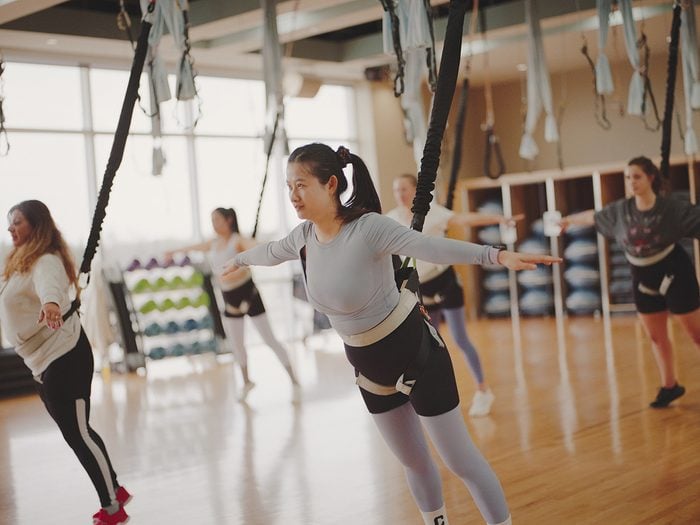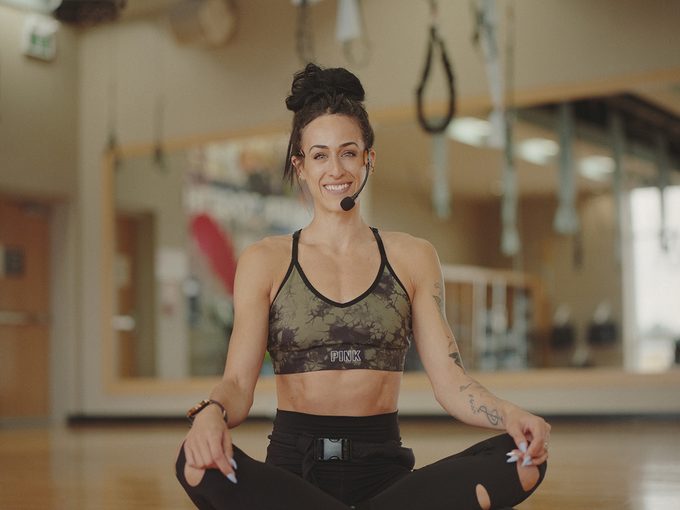Bungee Cord Fitness: The High-Intensity, Low-Impact Exercise You Need to Try

And of course, it's a lot of fun, too.
Late-night TikTok binges can lead you to the weirdest places. That’s how I came across a video clip from Sling Bungee, a gym in Oklahoma, with 2.7 million likes. In their high-flying bungee classes, participants were zooming through cord-assisted squats and fun choreography. I knew I had to try it, and promptly found a gym near me.
In these classes, you’re hooked to an elastic cord suspended from the ceiling, and your heart gets pumping as you soar, but because the bungee harness supports your weight, the workout is low-impact.
“For people who can’t jump on the floor, the bungee helps you land softly, so it’s not hard on your joints,” says Jayde Kabeya, an instructor and national manager of group fitness education at Movati Athletic, a chain of gyms that offers bungee cord classes. Kabeya, who trains all of Movati’s teachers on bungee fitness, adds that on top of the low-impact, high-intensity cardio that bungee provides, it works the glutes and core because you’re relying on those muscles to remain stable. Bungee is also great for all ages: Kabeya says that Movati allows students as young as 13 to join and she routinely teaches folks aged 60 and older. (Kabeya notes that anyone who has had a C-section or major surgery in the last year, or who has recently given birth, should get the go-ahead from their doctor first.)
Veronica Jamnik, an associate professor at York University’s School of Kinesiology and Health Science, says that bungee allows for pain-free weight-bearing exercise, which is “essential for bone and joint health, with a bit more ease.”
Jamnik also notes that bungee cord fitness encourages participants to move in all different directions: backward, forward and laterally. This kind of varied movement can have many benefits. Moving backward, for example, can improve stability and balance, and engaging those lesser-used muscles (we don’t move backward often) can help reduce lower back pain. “Bungee is great for people who need to work on strength and balance. It helps them get used to moving.”
Kabeya warned me that first-timers sometimes struggle to get comfortable in the bungee apparatus. She pointed me to a rack full of comically stiff-looking padded shorts, which stop the harness from digging into the skin and prevent any loose clothing from getting caught. Between the harness and the padded shorts worn over my pants, I felt all sucked in—and ready to fly.
To get us familiar with the sensation of being pulled by the bungee cord, we started by strutting in different directions, engaging our cores to propel ourselves forward. During bodyweight exercises such as squats and side-to-side lunges, the bungee cord allowed me to get deeper, and I had to use my obliques against the bungee’s resistance.
From there, Kabeya introduced some more complex moves. In bungee-supported planks, we fell forward onto our hands and pushed back up to standing, working our arms and core. Some jumps had us yelping for joy as we leapt higher than we expected. Kabeya taught us “the chandelier”: We grasped the cord, kicked off the floor and tucked up our legs as we spun around. Then we put all the moves together in a choreographed dance to “Trust Fall” by Pink. Even though my core and thighs were burning and I was totally out of breath, the hour-long class flew by. “You forget you’re working out, but by the end, you’re drenched in sweat,” says Kabeya. “Bungee makes working out fun.”

3 beginner tips for lift off
Jayde Kabeya, national bungee instructor at Movati Athletic, shares her top tips for first-time bungee cord workouts.
- Give it at least three tries. Your body needs to get used to the feeling of the harness. Plus, some of the moves depend on you putting a lot of trust into the bungee cord, which can be a bit daunting. “You have to learn how to use the bungee, and the first time isn’t the true experience because you don’t know how to move with it yet,” says Kabeya. “It takes about three times to get the full experience.”
- Start loose. Bungee cords can be tightened for more resistance, which makes them harder to move against when you’re hooked in. Most beginners should seek out cords with less resistance—your instructor can help you strap into the right one based on your height, weight and strength level. As you get better, you can try the more resistant cords to increase the difficulty.
- There are always modifications. While classes always start with small steps and hops before progressing to larger movements, Kabeya says that there are always options you can take if you’re not ready or comfortable with certain moves—like an extra step forward instead of a jump up. “We always start with learning how to transfer our weight, so you can learn how to trust the bungee,” she explains.




